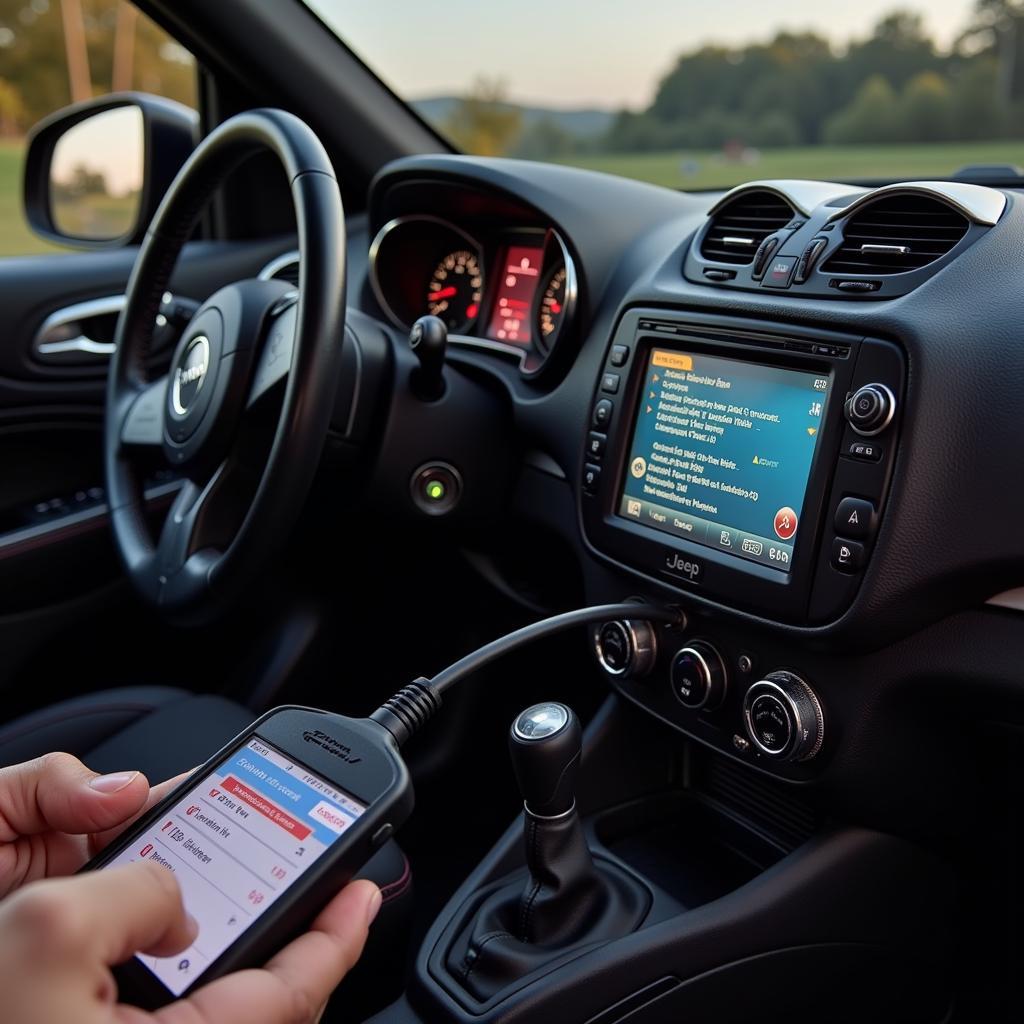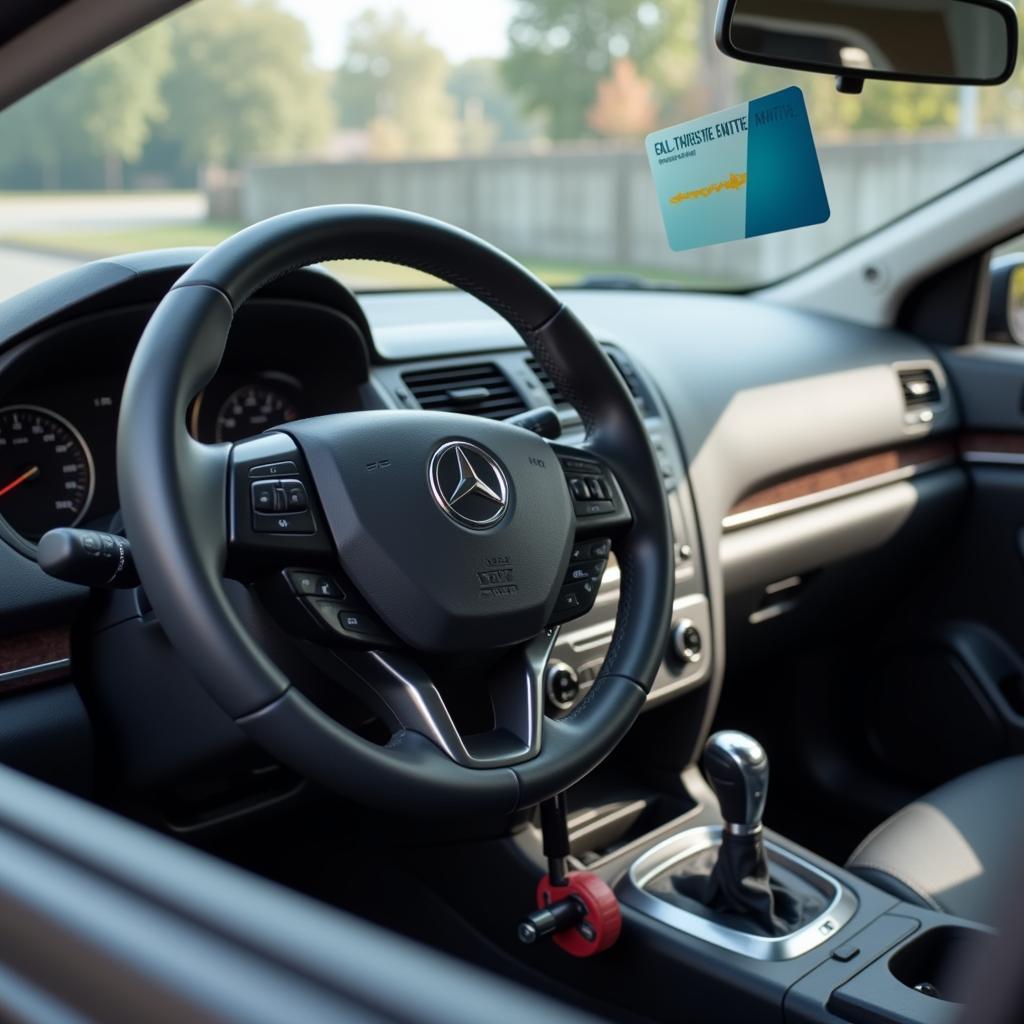A glowing parking brake warning light on your Jeep Cherokee dashboard can be a cause for concern. This article delves into the common reasons behind this issue and provides practical solutions to help you get back on the road safely.
Understanding Your Jeep Cherokee’s Parking Brake System
Before we jump into troubleshooting, let’s understand how the parking brake system functions in your Jeep Cherokee.
The parking brake, also known as the emergency brake, is a crucial safety feature. Unlike your regular brakes that use hydraulic pressure, the parking brake typically employs a cable system. When engaged, this cable mechanically locks the rear brakes, preventing the vehicle from rolling.
The warning light on your dashboard is designed to alert you if there’s a problem within this system.
Common Causes of a Jeep Cherokee Parking Brake Warning Light
Several factors can trigger the parking brake warning light in your Jeep Cherokee. Here are some of the most prevalent causes:
- Engaged Parking Brake: The most straightforward reason is an engaged or partially engaged parking brake. Always ensure the brake is fully released before driving.
- Low Brake Fluid: Low brake fluid levels can trigger the warning light. This usually indicates a leak in the brake system, requiring immediate attention.
- Faulty Parking Brake Switch: A malfunctioning parking brake switch can send a false signal to the dashboard, illuminating the warning light even when the brake is disengaged.
- Worn Brake Shoes/Pads: Worn-out brake shoes or pads in the rear drums can trigger the warning light, particularly in older Jeep Cherokee models.
- Damaged Parking Brake Cable: A stretched, broken, or misaligned parking brake cable can disrupt the system’s functionality, leading to the warning light.
- Electrical Issues: Electrical faults, such as a blown fuse or wiring problems within the parking brake circuit, can also trigger the warning light.
Troubleshooting the Parking Brake Warning Light
Now that you’re familiar with the common culprits, let’s explore some troubleshooting steps:
-
Check Your Parking Brake Lever: The first step is to confirm that your parking brake is fully disengaged. Sometimes, the lever might not be completely down, triggering the light.
-
Inspect Your Brake Fluid: Locate your Jeep Cherokee’s brake fluid reservoir and check the fluid level. If it’s low, there’s likely a leak in your braking system, demanding immediate professional inspection.
-
Inspect the Parking Brake Switch: Located at the base of the parking brake lever, the switch can malfunction. You can test it by engaging and disengaging the lever while observing if the dashboard light responds correctly.
-
Check for Diagnostic Trouble Codes (DTCs): If the warning light persists, consider connecting an OBD-II scanner to your Jeep Cherokee’s diagnostic port. This can reveal any stored trouble codes related to the parking brake system, providing more specific insights into the problem.
 OBD-II Scanner Connected to Jeep Cherokee
OBD-II Scanner Connected to Jeep Cherokee
- Seek Professional Assistance: If your troubleshooting efforts prove futile or you suspect a more complex issue, it’s crucial to consult a qualified mechanic specializing in Jeep vehicles. They possess the expertise and tools to diagnose and repair the problem accurately.
Preventative Measures
Preventing parking brake issues is always better than dealing with them. Here are some tips:
- Regularly Inspect Your Brake System: Regularly check your brake fluid level and look for any signs of leaks or damage in the brake lines, hoses, and calipers.
- Engage Your Parking Brake Regularly: Even when parked on a level surface, engaging the parking brake helps maintain cable tension and prevent it from seizing.
- Address Warning Lights Promptly: Never ignore any warning lights on your dashboard, especially those related to brakes. Early attention can prevent minor issues from escalating.
“Addressing brake system warnings promptly is crucial,” says seasoned Jeep mechanic, John Miller. “Ignoring them can lead to more extensive and costly repairs down the line.”
Jeep Cherokee Parking Brake Warning Light FAQs
Q: Can I drive my Jeep Cherokee with the parking brake warning light on?
A: It’s strongly advised against driving with any warning light illuminated, especially one related to your brakes. Doing so can potentially worsen the underlying issue and compromise your safety.
Q: How much does it cost to fix a Jeep Cherokee parking brake problem?
A: The repair cost varies widely depending on the underlying cause. A simple brake fluid top-up can be inexpensive, while a complete parking brake cable replacement can be significantly pricier.
Q: How often should I service my Jeep Cherokee’s brake system?
A: It’s recommended to have your Jeep Cherokee’s brake system inspected annually or every 12,000 miles, whichever comes first.
Conclusion
The parking brake warning light in your Jeep Cherokee serves as a vital safety indicator. Understanding its potential causes and taking appropriate action is essential to ensure your vehicle’s safe operation. If you encounter this issue, it’s always best to err on the side of caution and seek professional assistance.
For further insights and troubleshooting tips on specific Jeep Cherokee models, you can refer to our guides on 2005 Jeep Grand Cherokee Perform Brake Service Warning Light, Jeep Cherokee Brake Warning Light, 2002 Jeep Grand Cherokee Brake Warning Light, 2000 Jeep Cherokee Brake Warning Light and 2008 Jeep Grand Cherokee Brake Warning Lights. Remember, prioritizing your safety and addressing brake system issues promptly are paramount for a smooth and secure driving experience.


